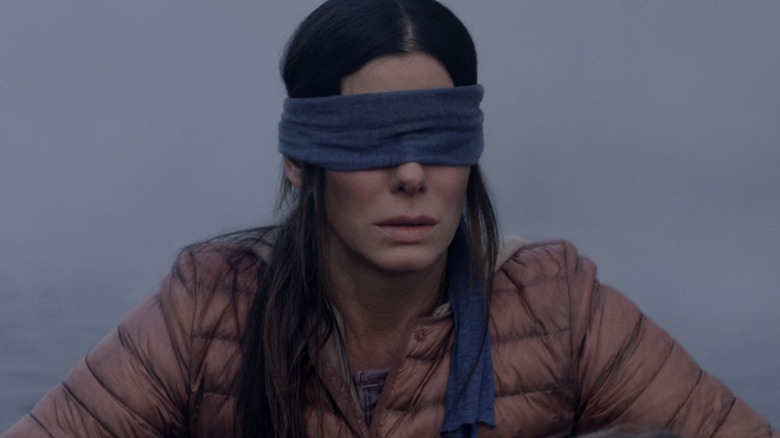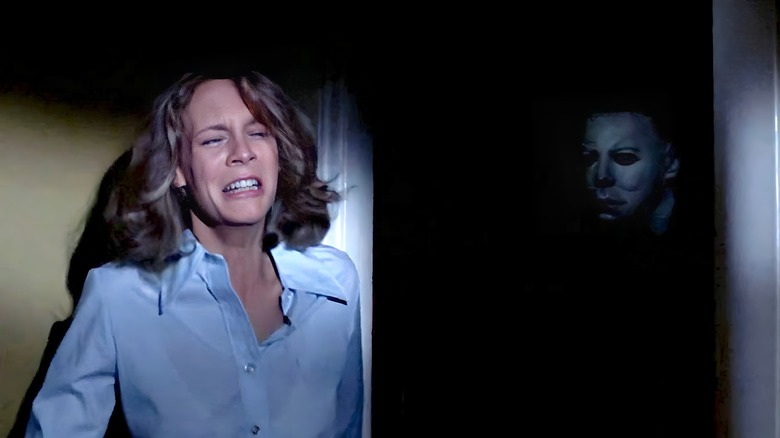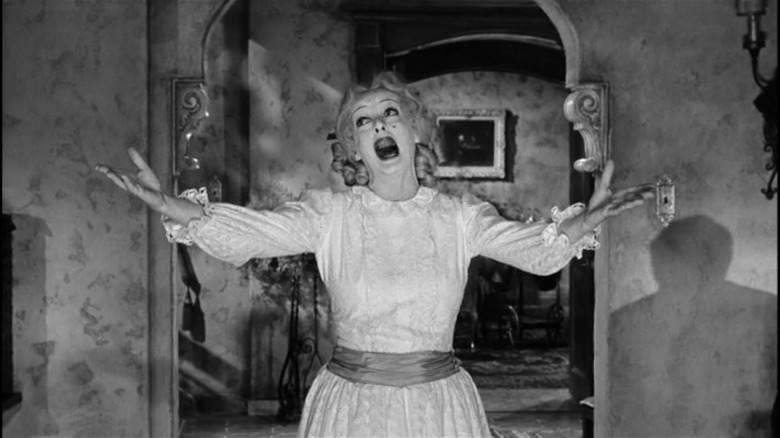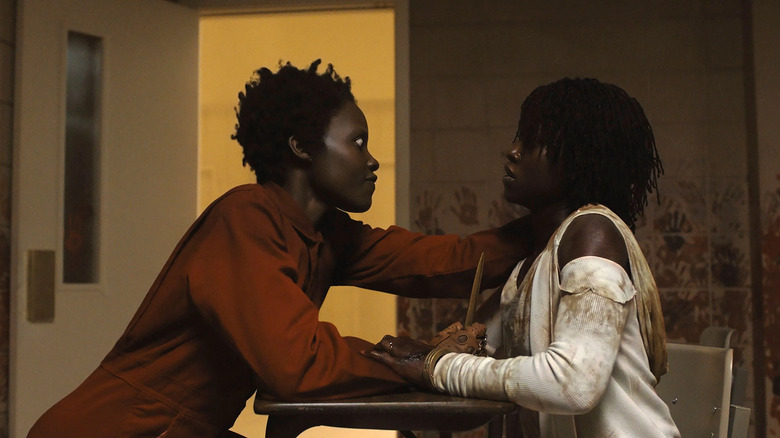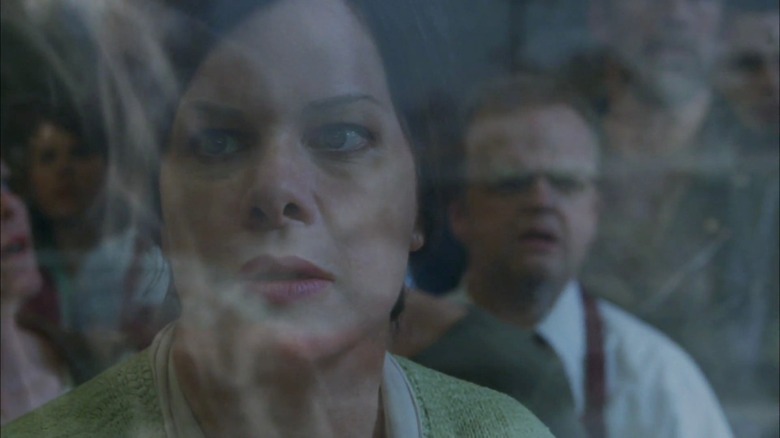Here's Why So Many Oscar-Winning Women Make Horror Movies
I wrote an article the other day about Octavia Spencer's turn in "Ma" and what it meant for her to play a horror villain after winning an Oscar for "The Help." And while I was doing that, I had a bit of a revelation as I browsed through the Academy Awards list of recent Best Actress and Best Supporting Actress winners — a lot of them have made horror movies following their wins. Just for a little bit of fun, I looked over the list of Best Actor and Best Supporting Actor winners and found the opposite to be true.
There are of course a handful of exceptions but by and large, men who win the big acting prizes at the Oscars tend to say goodbye to horror, while women end up returning to the genre. Four women have earned Oscars in horror or horror-adjacent performances (Natalie Portman in "Black Swan," Kathy Bates in "Misery," Jodie Foster in "The Silence of the Lambs," and Ruth Gordon in "Rosemary's Baby") but considering the Oscars' less-than-stellar track record with horror as a whole, one would assume a prestigious, acclaimed performer like an Oscar winner would avoid the scary scene like the plague.
And yet, filmographies don't lie — women who win Oscars consistently pop up in horror films. While there's no way to point to data-supported evidence to provide a definitive answer as to why this happens, I have a few theories. Humor me, won't you?
It's where many got their start
They say you never forget where you came from and a lot of actors came from the world of horror. Low-budget films are generally maligned in the eyes of critics and audiences alike, but low-budget horror films can turn into sleeper hits that make studios huge profits and put up-and-coming actors on the map. Horror fans are the type of folks who are happy to celebrate a random one-off performance in some 1980s slasher no one has ever heard of, which means there's an extra boost of excitement when a high-profile performer is willing to play in the spooky sandbox. It's even better when an actor is making a return to the genre after years of success elsewhere.
During the press tour for "Halloween Ends," Jamie Lee Curtis reflected on her legacy of playing perennial final girl, Laurie Strode, and often joked that when she inevitably dies, her obituary will reference her career as a scream queen. Curtis is a generational talent with a career spanning over 45 years and is now an Oscar winner, but she's right to recognize her connection to horror is the most powerful. Hell, during her Oscar acceptance speech, she took a moment to thank the people who have supported her genre films over the years, declaring, "We just won an Oscar together!"
Horror fans are used to being treated like the black sheep of the cinephile landscape, so if an Oscar winner wants to hang around our haunts, they're going to be embraced like royalty. After all, there's no "scream queen" equivalent for period-piece dramas.
Horror is a genre full of rich roles for women
While the entire film industry at large desperately needs an overhaul on hiring women, LGBTQIA+ folks, and people of color behind the camera, the horror genre has historically and consistently provided dynamic roles for women on screen. Women are afforded a wide range of characters within the genre and though there are certainly plenty of archetypes and tropes, there are just as many roles to subvert expectations. Final girls, monstrous femmes, bubbly best friends, and even "Hitchcock blondes" are merely scratching the surface of the types of roles available for women to play. And it's not limited to young starlets, either.
The "hagsploitation" or "psycho-biddy" subgenre thrives on showcasing glamorous older actresses as villainous, monstrous hags, earning the moniker of Grande Dame Guignol. The later career resurgence of Oscar winners in horror like Joan Crawford, Bette Davis, and Olivia de Havilland paved the way for someone like Jessica Lange to become the face of "American Horror Story." And older women aren't restricted to playing terrifying old crones either, as beloved character actress Lin Shaye has been the face of the "Insidious" franchise for over a decade.
The genre also allows these highly-acclaimed performers to subvert the audience's expectations. Meryl Streep in "Death Becomes Her," Sandra Bullock in "Bird Box," Nicole Kidman in "The Stepford Wives," and Lupita Nyong'o in "Us" all delivered phenomenal performances that were absolutely nothing like the characters that brought them their gold statues. In some cases, like Nyong'o, the horror performance was so good that many felt an Oscar nomination was deserving.
The gold overpowers the ghoulish
Plenty of actors have gone on record to talk about how their managers or agents have urged them not to take a role in a horror film, fearful that their client would either be typecast moving forward as someone who only does horror movies or that their shining star would somehow be dulled by the association with the genre.
The horror-comedy slasher "The Final Girls" has an entire subplot about an actress named Amanda (Malin Åkerman) who is struggling to find work because every casting director in town only sees her as the role she played in a cheeseball slasher movie early in her career. This is a legitimate fear a lot of actors have, but as Jenna Ortega has already proved, embracing horror can make you an icon.
But being able to add "Academy Award-winner" before a name on a poster or in a trailer offers the type of career freedom most would kill for. Making a horror film after winning an Oscar should theoretically cancel out any perceived negativity. I say "perceived" because I don't believe horror should be viewed as a dirty word, but I also recognize that there are a lot of idiots with exponentially more power and influence than I'll ever have that do think horror is a bad thing. Fortunately, they're wrong.
Rich, but wrong.
Horror movies are good
Despite what the Academy or "prestigious" lists like the Sight and Sound poll would have you believe, horror movies are good, actually. Are there dreadful messes of unwatchable trash in the horror genre? Yes, but there are also plenty of melodramatic nonsensical garbage dramas, biopics, and works of "Oscar bait" too. The only difference is that when one of these films fails to deliver — like "Amsterdam," "Extremely Loud & Incredibly Close," or "Pay it Forward" — the Academy doesn't write off an entire genre. When /Film put together the list of the top 100 movies of all time, we differed from most of our contemporaries if only for how many horror films made the list.
Michelle Yeoh, fresh off her Best Actress win for "Everything Everywhere All At Once" will be appearing in "A Haunting in Venice," because winning the award doesn't suddenly mean Yeoh is going to turn her back on the dismissed genres of film like horror or martial arts that made her a living legend long before the Academy came knocking. And she's in great company as Jessica Chastain, Emma Stone, Brie Larson, Julianne Moore, Jennifer Lawrence, Helen Mirren, Natalie Portman, Halle Berry, Helen Hunt, Charlize Theron, Rachel Weisz, Marcia Gay Harden, Anna Paquin, Tilda Swinton, and Hilary Swank have all signed up for horror films after taking home the top prize. And that's just looking at recent Best Actress and Best Supporting Actress winners.
I'd say it's odd that so many Oscar-winning women star in horror movies (even more if we count nominated performers like Jennifer Tilly), but it feels like a no-brainer. Horror allows space for fun, challenging work, and the chance to become a God in the eyes of one of the most dedicated fandoms out there. Who wouldn't want to join in on the fun?
